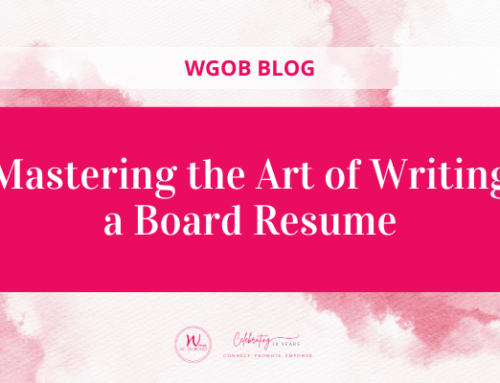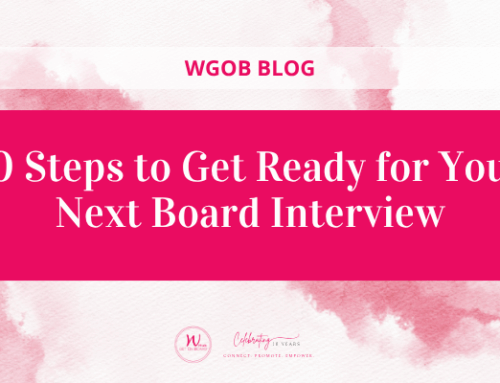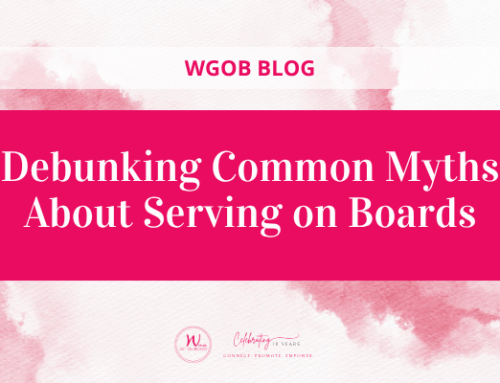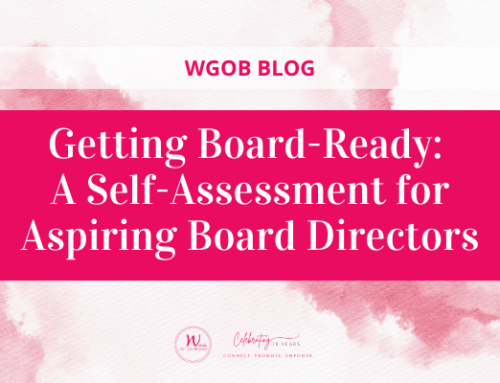Women Get On Board Inc. (WGOB) is a member-based company that connects, promotes and empowers women to corporate boards. On April 13th, we held our virtual WGOB Speaker Series sponsored by Odgers Berndtson. This virtual speaker series featured a panel format to provide an in-depth look at public sector boards.
Deborah Rosati, FCPA, FCA, ICD.D, Corporate Director, Founder & CEO of WGOB kicked off the panel by introducing the moderator, Elaine Roper, Head of Board Practice at Odgers Berndtson. Elaine introduced the two panelists:
- Wendy Kei, Board Chair at Ontario Power Generation Inc. (OPG)
- Barbara Kieley, Retired Partner at Ernst & Young
At WGOB, we are often asked about public sector boards. These boards—which oversee government-funded agencies and crown corporations at various levels of government—offer rewarding opportunities to tackle complex governance and business issues. But how do you navigate your way onto a public sector board? And what can you expect from your public sector board experience?
Why serve on a public sector board?
Joining a public sector board is an excellent way to use your business acumen to serve your community.
“If you choose to serve in the sector, it is often a choice to give back or contribute to the building or running of your city, province, or country,” said Elaine.
A perk of serving on public sector boards is the endless variety of fields and industries. Public sector board opportunities can be found in arts and culture, financial services, electricity, regulatory organizations, infrastructure, social assistance, conservation—the list goes on. And with numerous stakeholders, projects, and issues at play, the work is typically engaging and challenging.
Some directors choose to dedicate their entire board service to the public sector, while others serve on one or two public sector boards to round out their board portfolio. No matter your approach, joining a public sector board can be a meaningful way to give back to your community.
How do you apply for a public sector board?
Applicants for public sector boards are typically asked to fill out formal applications online. However, do your research before you apply. Find out who is on the boards you are interested in, contact them, and learn what qualifications you need to apply successfully. To build your resume for the public sector, our panelists suggested gaining experience on non-profit boards, which can help you better understand the fundamentals of governance.
As Wendy pointed out, growing your public profile can also help your applications. She was offered her first public sector board position after her name appeared on the Canadian Board Diversity Council’s “Diversity 50” list. A recruiter was looking for an accountant to serve on a public sector board, and Wendy fit the profile perfectly.
“Get yourself out there and get your name recognized,” said Wendy. “There are lots of opportunities.”
She also recommends keeping your LinkedIn account updated with your latest board memberships, as recruiters often use online profiles to assess potential candidates.
What can you expect from a public sector board?
Public sector boards handle issues that are often similar to those that corporate boards face. Like the private sector, public sector directors handle complex governance, reputational issues, complicated strategy, operational matters and sizeable budgets.
However, if you serve on a public sector board, you can expect additional challenges beyond the typical board topics—as well as a steep learning curve. Barbara said that she was impressed by the range and complexity of the issues that are discussed on her public sector boards, which can include everything from public policy and innovation, to risk management, program delivery, public use of funds, and transformation.
“When you weigh in on these topics, it requires careful preparation,” said Barbara. “And some very interesting debate, I might add.”
Barbara explained that in addition to bringing their own expertise to the table, public sector board members should stay up to date on current events, examine the political issues at play in each decision, and acknowledge the various competing agendas involved. Other unique considerations include conflict of interest guidelines and expectations, both real and perceived.
As for the commitment involved, the meeting cadence for public sector boards varies from role to role, similarly to corporate board roles. Board members should plan for substantial preparation time before each meeting, recognizing the complexity of the topics discussed.
“The rule of thumb I use is that it takes you twice as long as the length of the meeting to get yourself ready,” said Barbara.
The bottom line
Serving on public sector boards can be a rewarding option to grow your board resume and give back to your community. If you enjoy a purpose-driven, challenging environment, you will thrive as a public sector director.
Our panelists heartily encouraged women who are considering public board service to take the leap.
“Apply! Get your name out there because there are tons of opportunities,” said Wendy. “They’re looking for people with diverse backgrounds to serve on these boards.”
Interested in learning more about effective boards and governance? Join us for our next virtual WGOB Speaker Series on May 11th called “The Great Chair”, a fireside chat with author Brian Hayward and Scott Baldwin, Board Director and Co-founder DirectorPrep.com. Register here.






